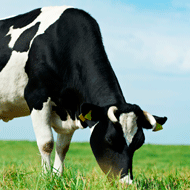Bristol vets to benchmark farm animal medicine use

"This project will provide the beef industry with tools required to achieve and even exceed the RUMA targets" - Dr Kristen Reyher.
A new project to quantify and compare farm animal medicine use across UK beef farms has been launched by the University of Bristol.
The project, ‘Strategies to benchmark and communicate farm medicine use in cattle operations,’ will begin this summer and run for 18 months. Funded by AHDB Beef & Lamb, it will see farmers given the tools and information needed to accurately assess, record and benchmark their medicine use.
An estimated 700,000 people are killed by drug-resistant infections every year. The responsible use of farm animal medicines is key to combatting the growing problem of antimicrobial resistance (AMR).
To maintain animal health and ensure safe and sustainable food production, farmers and veterinary surgeons must demonstrate responsible and evidence-based farm medicine usage. However, beef producers face challenges in achieving recent RUMA targets for medical use, as significant gaps in data exist regarding quantities and types of medicines used.
In the project, researchers from Bristol Veterinary School will lead the way with farmers and veterinary surgeons to combat AMR by changing antimicrobial use on farms.
“This project will provide the beef industry with tools required to achieve and even exceed the RUMA targets, while demonstrating and communicating the gains made to consumers, processors, retailers and policymakers,” explains Dr Kristen Reyher from Bristol Veterinary School.
The study will be funded by the agriculture and horticulture development board AHDB Beef & Lamb and involve a range of industry advisors, including the University of Edinburgh and The Veterinary Medicines Directorate.



 The veterinary mental health charity Vetlife is inviting the veterinary community to join it for a sponsored cold-water dip.
The veterinary mental health charity Vetlife is inviting the veterinary community to join it for a sponsored cold-water dip.